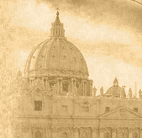 Francis X. Rocca of the Catholic News Service writes, … On the first visit by a pope to the United Nations, in 1965, Pope Paul VI memorably called for “No more war, war never again.” Blessed John Paul II was a constant campaigner for peace, calling the interfaith meetings in Assisi, praying for an end to violence in the Balkans, and doing everything he could, publicly and privately, to prevent the 2003 invasion of Iraq…
Francis X. Rocca of the Catholic News Service writes, … On the first visit by a pope to the United Nations, in 1965, Pope Paul VI memorably called for “No more war, war never again.” Blessed John Paul II was a constant campaigner for peace, calling the interfaith meetings in Assisi, praying for an end to violence in the Balkans, and doing everything he could, publicly and privately, to prevent the 2003 invasion of Iraq…
…
It was only in the 20th century that the bishop of Rome emerged as a reliable voice against war as a way of resolving international disputes. Pope Benedict XV made extensive efforts to broker an end to the carnage of World War I, and Pope Pius XII sought through diplomatic channels to head off World War II.
That change certainly reflects the vast leap in destructive power of military technology in the industrial age, which has made the conditions set by Catholic social teaching for waging a just war all but impossible to meet.
In 1963, Blessed John XXIII wrote in his encyclical “Pacem in Terris” that nuclear weapons had made war finally unacceptable as a means of redressing injustice. And Pope Francis, while opposing military intervention in Syria, has stressed that he condemns with “utmost firmness” any use of chemical weapons, a recent instance of which is Obama’s justification for striking the forces of Syrian President Bashar Assad.
Visit the full article Catholic News Service
Tags: Catholic News Service, peace, Pope, Vatican

